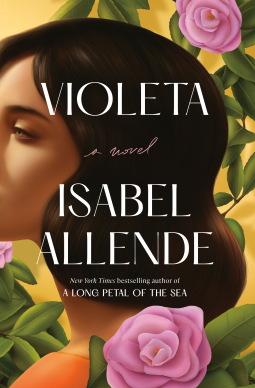Isabelle Allende begins her novel, Violeta, with Violeta’s letter to Camilo whom she loves “more than anyone in this world.” She promises to tell him her life story that is worthy of a novel, more because of her sins than because of her virtues. She wants him to destroy the letters she has already written him over the years that skipped over the sins because they are overly sentimental and keep this account as a replacement in case he wants to stop and remember her.
The rest of the book sounds like a memoir beginning with her birth in South America on a stormy Friday in 1920, the year of the scourge, into a family with five brothers. Simultaneously, the Great War and the Spanish flu arrive. Her father has enough foresight to get his family out of danger into a rural area far different from the life they had always enjoyed in the city.
Violeta tells her adult story frankly, including her sins, with no notion to the reader about the recipient of this epistle until well past the time of intense wondering who she would bare her soul to in such a way. Somehow, she manages to survive and even thrive during a lifetime of bad choices in men, a daughter caught up in a drug culture, and fights for civil rights in her personal life and historical crises in the world around her.
Violeta is nearing 100 years old as she completes her novel in the midst of another pandemic with an additional word to Camilo. It would be hard to miss the similarity in format and the compelling nature to the novel, The Autobiography of Miss Jane Pittman. My own evaluation, from my advance reading copy furnished by Net Galley, is that that Violeta’s 100 years is indeed worthy of a novel. It goes on sale on January 25. If you decide to read and discover that she sometimes imparts too much personal information, don’t say I didn’t warn you.
